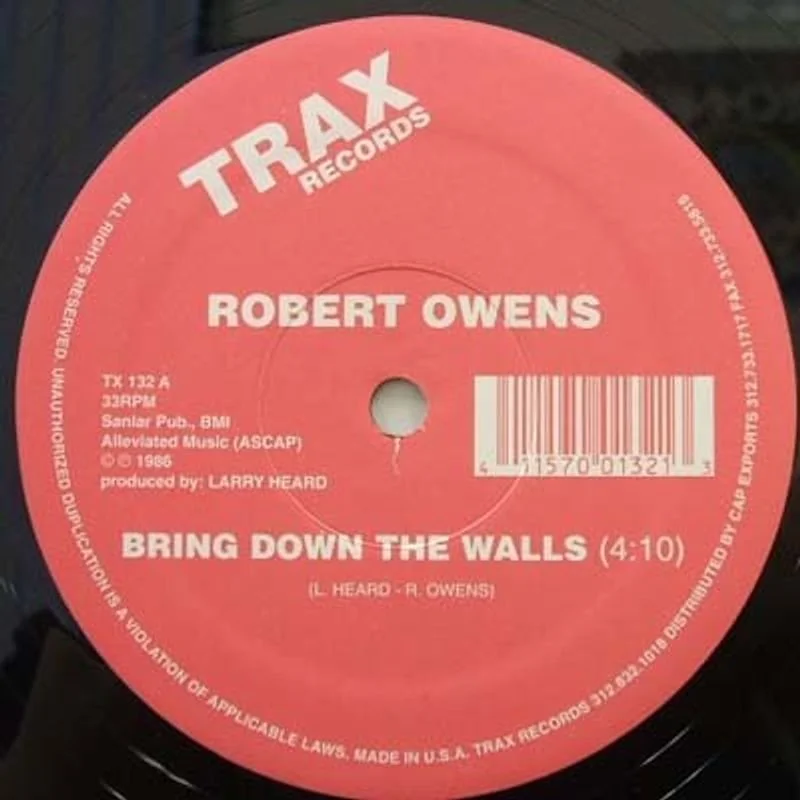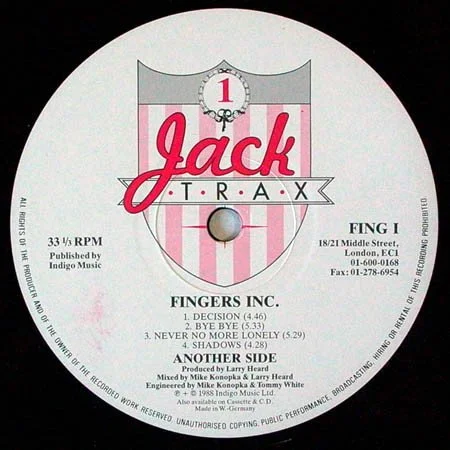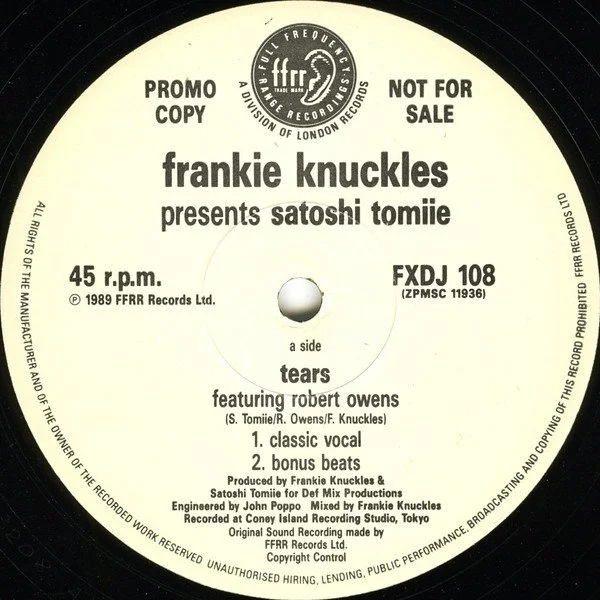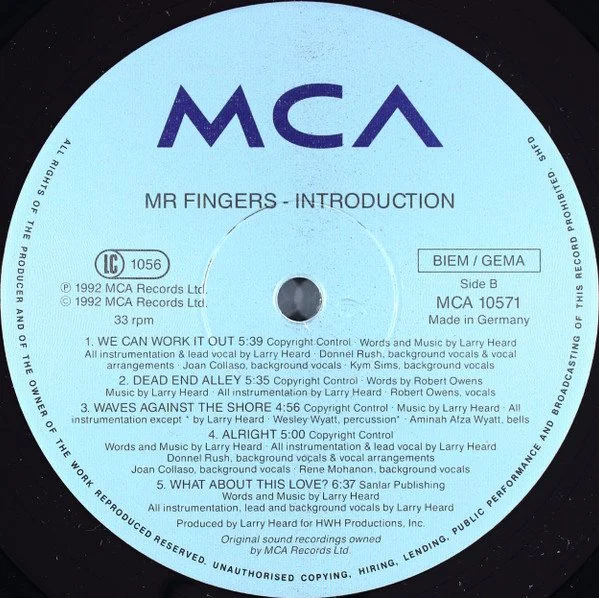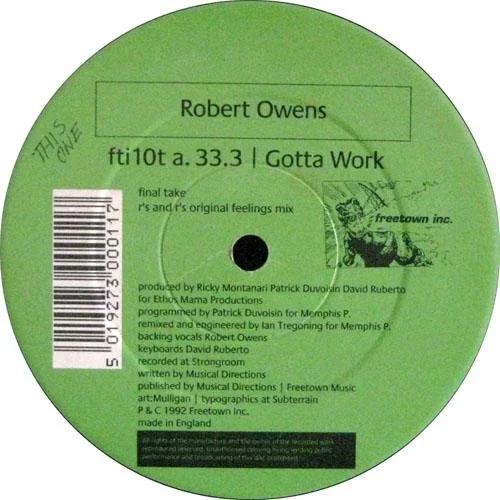
Getting behind the groove with . . .
Robert Owens.
“ You have to keep it rolling, while you can keep it rolling!”
Interviewer/Editor: Alex Rose
Earlier this month, we were HUMBLED to spend some time GETTING BEHIND THE GROOVE with ONE OF UNDERGROUND HOUSE MUSIC’S MOST PROLIFIC ARTISTS OF ALL TIME, Welcome along Mr ROBERT OWENS . . .
Listen (above), or read the full Robert Owens interview (below) - View on desktop/laptop for optimal experience!!
PREAMBLE:
Robert Owens is a name synonymous with the birth and formation of the early ‘golden era’ underground house music scene that grew out of Chicago. With a career that spans back as far as the mid 80’s and known for his silky, versatile unique vocal style, Robert has been a part of some of the most iconic, influential pieces of landmark underground house music in the scene’s history. Working from the very beginning of his career with with scene forming figures like Frankie Knuckles, Larry Heard, Satoshie Tommie, David Morales and countless others, Robert’s contributions underground house music serve as a lesson in longevity, as Robert continues to be one of the most prominent, persistent, hardest working recording artists in electronic music.
Robert Owens: Hi, I'm Robert Owens. Thank you for inviting me here to share a little piece of my thoughts about my life and me evolving within this music industry.
BTG: Welcome along Robert. We are here to celebrate and venerate your outstanding early contributions to what was a fledgling underground house and techno scene spanning way back into the mid '80s. We'll be really digging into some hand selected pinnacle productions that you created or were certainly a part of in those early days of the scene. But before we do that, maybe you could just take us back to your early years. How did music become such an important part of your life? What were your influences in the early days?
Robert Owens: From a child, as far back as I can remember. I had aunts and different relatives that saw something in me. I would be at dance halls, at family reunions, I would win those kind of little affairs. It was something instilled in me in those earlier stages of life, just from aunts and certain relatives believing in you. And beyond that, growing up in neighbourhoods, I would always ask somebody if they wanted to form a band or a group. From a young age, I enjoyed entertaining people and it probably kicked off from my dancing. I was probably one of the better ones in the family. I used to win a lot of the little home contests we did. And in the neighbourhood, I would try to put little singing groups together.
I put a little bands together, going around asking "Man, can you play some drums or something?” And so we’d form a little group, we even tried some talent contests and different things, but I think in the end, most situations would last for maybe a few months or so, and something stupid would break them up. And I was the only one that was really serious and passionate.
BTG: Sure.
Robert Owens: So to that point, if it wasn't working or it wasn't moving forward, I would cut it off and then I would seek something else. I was always searching for something that would be consistent. And that evolved into me going around to different clubs and pubs in the Chicago area and just asking different people, "Do you need a DJ? Do you want a DJ?" And I think first DJ gigs in a pub, was I just happened to go into this pub where the owner was arguing with the DJ and he fired him right when I was there haha! So when he fired, he was angry and walking off, I go up, "Do you need a DJ?"
BTG: Oh man, perfect timing!
Robert Owens: And he said, "Yeah, you're hired." So, that's amazing that something like that happened. And I think I ended up playing there like five or six nights a week straight. And that was my first really consistent DJ gig.
I would get together with different collectives. And I think one scenario is when I had a roommate and we just decided to let's do some house parties, because we had a big apartment and we both were going down to the Warehouse, Music Box, and everything. So a lot of that clique clientele, they all knew each other and, even some of us, it was like almost skipping around from one house. You might be at Frankie Knuckles house one hour, two hours, then you went over to Ron Hardy's house. Then you was over to somebody else house in the clique. And it was just this house hopping into the club. And then when it evolved to me actually meeting Larry Heard, was probably the first artist I collaborated with him, meeting him, and some of those early materials and stuff. I started passing around to Frankie Knuckles and Ron Hardy. I even played the Mysteries of Love, Can You Feel It, Washing Machine, and all of that. I had it on cassettes and Ron Hardy couldn't play at the Music Box one night.
They asked me to come fill in for him. And I played those tracks and I think I played Mysteries of Love and Can You Feel It a few times, over and over. And you're just seeing how the people went into this hypnotic kind of phase over them. And I was like, something is there! Larry Heard is more just a creative genius, but I was the ear. I was right there on the circuit and around them. Even before this, when they would hear I might have had some sampled up loop of something I was playing, they’d ask. "What's this track I heard Robert was playing" or something and vice versa. like If I heard something they were playing. Everybody was listening and checking what everybody was doing. I just never was an in your face kind of person, I stayed more in the background, but I was there and they were checking and listening to a lot of early things that I did.
BTG: That's amazing.
Robert Owens: Giving them stuff on cassette too, where I might have splice edited because we was using he pitch control cassette decks, where you could use the pause button on those early pioneers and stuff, just like you was doing a splice edit thing. So I did a lot of splice editing and gave them different things and they played them.
It was more important to just sit back and watch and focus on the true essence of what it was about. And that was about entertaining, watching people whose emotions and feelings and trying to tune into that and make them happy. And that's what it's always been about for me.

"Ron Hardy couldn't play at the Music Box one night. They asked me to come fill in for him. And I played MYSTERIES OF LOVE AND And Can You Feel It a few times. And you're just seeing how the people went into this hypnotic kind of phase over them. "
- Robert Owens
1986 - Fingers Inc / Robert Owens - Bring Down the Walls
BTG: So the first track that I wanted to dig into and really dig you out on was 1986, Fingers Inc. Bring Down The Walls.
Robert Owens: Bring Down The Walls!
BTG: So I never heard this track until 1991 or '92, because I was slightly younger. I was about 13 or 14 when I first heard it, but this was one of my first introductions to underground house music. And it just blew my mind, it's just a raw unapologetic, heavy hitting, strong drum programming and baseline, with effects over the top. And with your real commanding vocal, that track is just incredible. Can you just tell us a little bit about that time?
Robert Owens: Well it was actually just a demo and even we was worried at one point, the bell goes off ringing and it's "Oh, this is a mistake." And every time they would play that in the Paradise Garage or something, and the bell would ring, people thought it was an effect and they'd be like Yeah! screaming. And I was like, That's funny, me and Larry both would look at each other, That's amazing. They don't even know it's a mistake.
But with a lot of those early ideas, at points he lived right near me, so he'd call and say, "Oh, I got something." And that (Bring Down the walls) was one of those tracks where he said, "I got this track" and I went over and I listened to it. I was like, "Oh, I got some words to match that. And I just sung it right there in the living room and that was the take.
BTG: Oh man.
Robert Owens: During a lot of those early stages, a lot of those guys when they first got those early drum machines, the 707, 808, 303s, Juno 106 keyboards and stuff. They were learning as they were going along. So some of the first earlier blueprints of what they were doing, that was it. So you just came in and you listened to what was there and I just recorded over it.
1986 - Fingers Inc - Never No More Lonely
BTG: So let's talk about another one. 1988, Never Know More Lonely, another cut which was like a Fingers Inc. cut, right?
Robert Owens: A friend of mine named Tony Harris, which was like a protege of mine, that he learned the DJing stuff from me. He's actually the first one that met Larry and he introduced me to Larry. And Larry, like I said, the earlier tracks, Mysteries of Love, Can You Feel It, Washing Machine and all that, he gave me those tracks and I played them. But after that, he asked me to come over his house, and then he played me ‘A Path’ and some other things. And I had my little booklet and I was like, "Oh, I got some words to go to that." That's when we come to probably Never Know More Lonely. And me adding even vocals to the Mysteries of Love track and different things.
In this period, Damon D'Cruz from England comes into play and asked Larry about doing the double album. Because after maybe the first few tracks, he was like, "We should form a group." And I was like, "Cool." "So Larry says “I’m already Mr Fingers. So let's call it Fingers Inc." I'm like, "Okay, cool." And so Fingers Inc. is born. And so I just start doing a bunch of demos, and it just evolved from there, but that Never No More Lonely track was a part of that whole collective when I was writing for the double album.
1989 - Frankie Knuckles presents Satoshie Tomiie - Tears
BTG: And so let's talk about another one. 1989, I think it's titled as Frankie Knuckles Presents Satoshi Tomiie, Tears. So, this is exquisite production. It's just a beautiful song all round, from the vocal line to the actual production of the track. It's just the height of production. And this is like 1989. So to me, that track was "that Robert Owens track, Tears", but of course it's not.
Robert Owens: Ha, I even remember going in to sing it in Studio 54. And it was like, "We want to hear Frankie Knuckles sing, what are you doing up there?"
BTG: Serious? Haha!
Robert Owens: I'm like "Oh my God… are they going to boo me off the stage" or whatever. And so then I start singing and they're like, Wait that's the voice!.
BTG: But the song is just such an amazing song. What inspired that?
Robert Owens: So there’s a message being sent around. Tell get in touch with Robert, tell him I want him to hear this song that I'm doing. I want him to write some words or something on ." And so he comes to Chicago and he's playing in Chicago up north somewhere. And then I came out and I listened to it and I was like, "Oh, it's nice track." I was like, "Okay, I'll go back home and write some words for it." And I wrote the words and let my mother and father see what I had wrote. And it was cool, so I called him up and recited what I had written. And then they flew me into New York, I think a few days later to record the vocals. But then I met Satoshi and what I understand, Satoshi was a big fan of Fingers Inc. So he always wanted to meet me and Larry. I think he had asked about me actually being on the track.
1991 - Robert Owens - I’ll be your Friend
BTG: So let's move on to another one which I want to talk about. Which is probably one of the most prominent tracks, which I know you've thought and I still play in sets today gets an incredible response, which is 1991, I'll Be Your Friend.
This is a blueprint landmark piece of music. Again, the production, it's like a lesson in deep house before the term even existed. It's just such a solid dubby, amazing drum programming, just an incredible track. So 30 years on, that track still really sets dance floors on fire now.
Robert Owens: Another grateful moment, I feel blessed for all the different artists. I've worked with, Larry up to Frankie, Dave and Morales, so many artists. But even there, I just went in and I think I did the vocals and forgot about it completely. They didn't say nothing over the next few weeks so I thought nobody liked it. And I think I was in Japan, they was playing it. And then some friends called me and they're like, "This big record over here by you, they playing on the radio all the time." And I'm like, "Really?" And then I think I got back off a tour one time in Japan and we were in the Sound Factory or something and this record kept coming on. And people, even us, we jump up and start dancing and stuff. "There that record is again." And then about the fourth time Frankie played, cause a lot of them DJs they play things three or four times. And about the fourth time it's locked in your head. We jump up and somebody say, "Fool, ain't that you singing?" And I'm like, "Oh yeah!"
BTG: Haha! No way, serious?
Robert Owens: I'm like, "It is me." I was like, "I forgot it, completely forgot about it." And this is a year later. Funny that I had completely forgot about it. People were playing it on the radio in different places. And so I think they was forced to try to push to get it out.
BTG: It's just an absolute credit to you. It's incredible.
Robert Owens: Thank you. But often you don't know, because again, in most cases I do things really quick. I can go in and lay a basic vocal, a half an hour to get you a basic vocal. And then sometimes I even ask, "Are you sure it's all right?", And then nothing happens or it don't come out. So you just say, "Oh, maybe they didn't like it." And you move on.
BTG: And then before it, it's one year later and you have to remind yourself it's you you're listening to!
Robert Owens: Yea, somebody else have to tell me it's me! Haha!

I’ll be your friend:
I went in and did the vocals and forgot about it completely… And then about a year later… we were in the Sound Factory or something and this record kept coming on. And people, even us, we jump up and start dancing… And then after about the fourth time Frankie played it, somebody say to me, "Fool, ain't that you singing?" And I'm like, "Oh yeah!"
Robert Owens
1992 - Mr Fingers - Dead End Alley
BTG: Hey, can we talk about another one now… Which is one of my all time favourite albums that explores early jazz infused house music, which is the Mr. Fingers Introduction album. So the track I wanted to call out and ask you about to dig into off of Introduction, is Dead End Alley. I was pretty hypnotised by this track because some friends of mine were putting it onto mix tapes around that time. And I think my friend had two copies of it. So was just looping the start of the track over and over, because it's not a particularly long introduction before it drops straight into the track, but he was just mixing the beginning back and forth. Because it's got this squelchy incredible baseline. It's just so amazing and just sounds great looped up. And then of course it dropped properly and it's the full vocal track with you singing and the vocal in it is just incredible. And it's just unmistakably Robert Owens. Tell me a bit about that one?
Robert Owens: He wanted to keep some element of Fingers Inc. in there on this album too as well. So that's probably what that was. Because you think it reminds you somewhat of some of the other Fingers Inc. vibes, like I'm Strong or something. Maybe he wanted to keep some feeling of the group there too. Even though a lot of the album is taken in another direction of more personal to him, I think.
1992 - Robert Owens - Gotta Work
BTG: Another track, which I really wanted to ask you about is from 1992 and I felt like it went under the radar in the terms of my DJ friends. No one else seemed to be playing it except for me, which is ‘Gotta Work’.
Robert Owens: Love that track, but I don't even have a copy of it no more. And it's off and on, a few people mention that track to me with Ricky Montanari, Italian guy. I was working with Freetown Records at that particular period where it was a beautiful adventure for me because I was practically head of A&R for Freetown. And I brought Arnold Jarvis over, did a whole album on him that never came out. I put together an in-house choir for them. I had an 11 piece band even at one point with them. A whole studio lockout scenario where I had engineers, programmers. And Gotta Work came about in that period where Ricky came over one time, I think he might have been playing for a few different places in England and it might have been playing for one of the showcases for Freetown and he wanted to do something with me.
He just came in and played that music. And I just instantly put that thought together. And maybe because I was doing so much from back in the office and I was writing songs for these artists, I was going to showcases. I hand picked every musician and everything out for this whole scenario. And it's a section of my life that a lot of people don't know about it. It was in very inspiring, but I think I came into the studio to record the vocals after traveling probably back from Italy to somewhere else. And I didn't hardly have no sleep. And the thought just came up. "I gotta work. Gonna work." Regardless of how tired you feel, or whatever, you got to work, you got to keep it rolling, you got to keep it moving.
BTG: It's just an amazing track. But again, what I noticed about it was, I played it and a couple of other people played it, but I noticed, not many other did...
Robert Owens: But it was too deep!, it wasn't your typical four to the floor, what it was going on. And that was kind of me, I always went for the left of kind of thing. It was, "Okay. I know what's going on with that, but what if we try this with this?" If we could get one or two of them to work, we open up a new door.
BTG: Yeah, absolutely.

Gotta Work:
think I came into the studio to record the vocals after traveling probably back from Italy or somewhere. And I didn't hardly have no sleep. And the thought just came up. "I gotta work. Gonna work." Regardless of how tired you feel, or whatever, you got to work, you got to keep it rolling.
Robert Owens
Robert Owens: Yeah I didn't always go for the easiest option, or some obvious kind of route with things.
BTG: No. But you know what? This is why you are such an important person. With your music, you're always exploring different directions. And obviously if we do a massive leap to now, since then to now, it's an insane amount of collaborations and different people that you've worked with.
Robert Owens: Oh yeah. Go to Traxsource, you'll see over a thousand things there or something! BeatPort and all of these services. And you're right, from then to now, I'm working with some young artists that are right on it, with pumping, peak time tracks. You could play at any club. I've done techno tracks, I've done all kind of stuff now.
BTG: This is what I'm saying!
Robert Owens: It's right up there. And this is where I'm so grateful to be evolving and constantly evolving with the younger generation. I've never just been set in my ways. I think you should constantly be open and abreast to learning. And with this insight, it's just guided me towards a lot of these young, new people that are really inspiring with some of the musicality of where they're coming from.
BTG: Yeah. I just love it because, continuously down the years, though we've been talking here about the early years, of course, but that's because the Behind the Groove project is very much about that history, but forever all through the years, I see Robert Owens pops back up on something with say, Harry Romero or with Mr. C or with Steve Bug and it's every year, there's just more and more stuff and it's just appearing everywhere. It's amazing.
Robert Owens: Yeah. You have to keep it rolling while you can keep it rolling.
BTG: Absolutely!
Robert Owens: And my take on recording. I'm lucky I feel to constantly be evolving with this industry and meeting lots of new young artists. You think that's the real blessing, but it's keeping your mind abreast to learning and evolving.
BTG: I saw you last summer at the Summer Love festival in the UK, do you recall?
Robert Owens: That was beautiful. Yeah. So many great artists were there at that event. I felt so much love from the moment I walked into the front part of the arena. I hadn't even got into where the tents were. People were just coming up, "Hey." That really felt so nice because you had a really mature kind of crowd, from young to old. But a lot of the older crowd, they instantly recognised me and it was like, Ahhhh. So you right there with family, you really felt this family feeling with people. And then you had parents introducing you to their children and stuff. So it was really beautiful.
BTG: Amazing. I know that a good friend of mine, a guy called Neil, he managed to commandeer a bit of your time standing at the bar and he came and found me later on and said, "I just had amazing chat with Robert Owens!", it was such a great event!
Robert Owens: Well, thank you for today. I'm grateful for you and that you invited me to do this.
BTG: Well thank you so much for taking the time out with us today and taking us behind the groove, and Robert, please, from all of us here to you, please keep on doing, what you keep on doing!
Robert Owens: Thank you!




